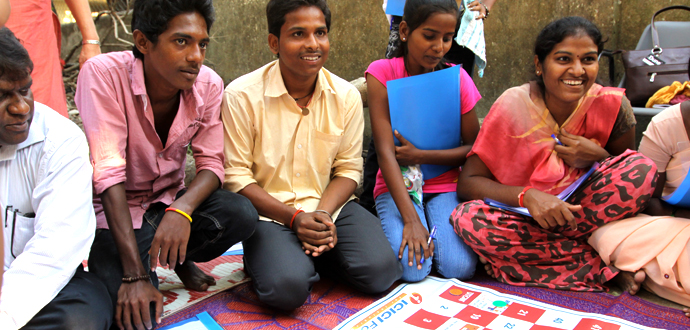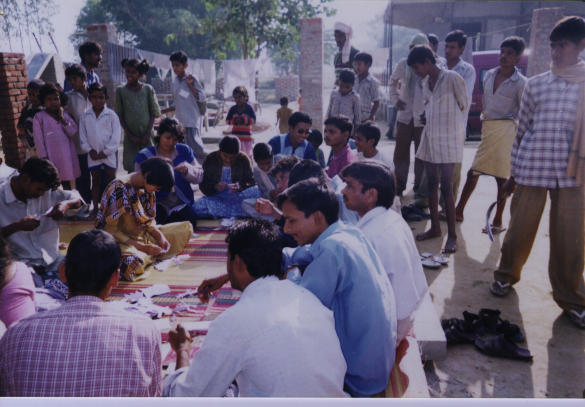NEW DELHI:
MetLife Foundation and
Sesame Workshop in India, the organization behind
Galli Galli Sim Sim (the Indian adaptation of Sesame Street), have recently launched a new multimedia global initiative called “Sapna, Bachat, Udaan: Aarthik Bal, Har Parivar ka Haq.” This initiative is the Indian adaptation of the global programme “Dream, Save, Do: Financial Empowerment for Families.” The programme, focuses on young children and their families (in particular the heads of households, more often women) with an intention to help them acquire prudent healthy financial skills and behaviour. The programme will provide engaging content featuring the
Galli Galli Sim Sim Muppets, language for discussion, and effective strategies for spending, saving, sharing and donating.
“Sapna, Bachat, Udaan” will expand to a total of 10 countries in the coming years. In India, it will reach the target population of 1.7 million people through community engagement (in Bihar, Delhi and Jharkhand) and over 18 million children through television (national). This programme will be evaluated by independent research to demonstrate the impact. The efforts are specifically tailored to address global needs as well as the particular needs of families in targeted countries. A core set of audio-visual, print and digital resources, were created for the initiative and will be shared and tailored in countries including India, Mexico, China and six other countries. “Both MetLife Foundation and Sesame Workshop have long histories of supporting the communities in which we work.
Our goal is to ensure that families have access to the knowledge which will put them on the path to financial security,” said Tarun Chugh, Managing Director & CEO, PNB MetLife.” In India we are also focusing on education and development of underprivileged through projects in Karnataka and Jammu & Kashmir.
Through our various CSR initiatives, we hope to create a positive impact on the lives of underprivileged children in the communities we operate in.” “Since 2009, Sesame Workshop in India and MetLife Foundation have partnered to deliver critical messages and content to children and the adults in their lives, using the power of multiple media platforms and the Sesame Street Muppets to help children grow smarter, stronger and kinder,” said Sashwati Banerjee, Managing Director, Sesame Workshop in India. “Being smart means knowing so much more than letters and numbers.
It means knowing how to solve problems and to think creatively. Our approach is to incorporate financial empowerment-related activities in daily routines and practices, facilitate open communication and interaction between children and adults. We will also provide valuable information and skills that address the needs of the whole child and help families and children be better prepared for the future and potential setbacks.” “Money is a part of a child’s everyday life, beginning at an early age with observations of the money habits of adults, and continuing to observe these habits throughout their entire lives,” said Dennis White, President and CEO, MetLife Foundation.
“It is important for children to develop a strong foundation that encourages wise financial decision-making.That’s why we’ve collaborated with Sesame Workshop, which has a proven track record of successfully educating communities in need worldwide. The partnership will help build financial empowerment among underserved families.” The benefit of acquiring healthy financial skills and behaviours goes beyond economic impact. Learning to set goals, plan, make choices, acquire knowledge and save through exposure to “Sapna, Bachat, Udaan” can assist families, for example, inaccessing preventative health services, which, in turn, decreases the likelihood of contracting serious health problems. In addition to family health, limiting access to education can have another ripple effect.
A lack of capital and financial reserves can be a barrier to families who want to provide for the education of their children. Over the last year, the two organizations have worked together to build a coalition of global and local advisors and specialists to inform content development. Financial empowerment is determined to have three core elements:
- “We can do it!” Having a positive attitude including having confidence and aspirations.
- “How can we do it?” Knowing behaviours related to self-regulation and executive function (conscious control of thoughts, feelings and actions) that can help set, plan and achieve goals.
- “What information do we need” Having the knowledge and information needed to achieve financial empowerment and reach one’s goals.
Research and advice from the global and local experts were used to drive the creation of messages and to gauge reach, understanding, and educational and social impact. Families will be exposed to a wide-range of multimedia content including new animated and live action segments, interactive games, comics, songs, activity sheets, and caregiver guides featuring the beloved Galli Galli Sim Sim characters through digital media, broadcast, community outreach, local events and seminars. The programme’s audio-visual content, print materials, digital games and facilitator guides will also be available on its website www.dreamsavedo.galligallisimsim.com.
An estimated 2.5 billion people worldwide are particularly vulnerable because of low income and lack of capacity to access affordable, safe financial services and products to help manage day to day expenses, respond to the unexpected, and save for the future. In India, approximately 98 per cent of the previously unbanked households with no-frills bank accounts have already been covered – under the Jan Dhan Yojana.
The challenge now is to make sure that the families improve their livelihoods and secure the future for their children. In November 2013, MetLife Foundation announced its commitment of $20 million over five years to Sesame Workshop to address financial empowerment among families with young children throughout the world. The funding, which is part of MetLife Foundation’s $200 million, five-year commitment to financial inclusion will reach close to 75 million people worldwide.












